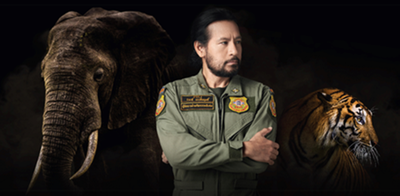Popular Actor-Director Campaigns Against Use of Tiger Skins and Fangs as Amulets in Thailand
With a concerned look in his eyes and a no-nonsense demeanor, actor-director Bhin Banloerit recalls how he had mistakenly believed in the past that “owning a tiger skin or fangs, especially from a male tiger, was like owning the spirit of a tiger”. He had searched for and bought these products for protection and luck, wearing the amulets around his neck or waist.
“That is the belief that I heard from my grandparents as handed down from generation to generation. When I started my career in the entertainment industry, I heard that these things would especially help me succeed. But in the last 15-20 years, I’ve seen that having these products by my side, never really helped me with anything. I became bankrupt from football gambling despite having all these items with me,” he says.
Banloerit is one of the champions of “A Good Life is Free of Killing” campaign jointly supported by USAID Wildlife Asia and WildAid. The campaign aims to reduce demand for ivory and tiger products which are believed to bring good luck and prevent harm by casting doubts about these beliefs. It is just one of USAID’s pioneering evidence-based social and behavior change communication (SBCC) campaigns targeted at the consumers of wildlife to reduce demand in China, Vietnam, and Thailand.
In addition to appearing in the campaign posters and public service announcements, Banloerit recently published an opinion-editorial in Thailand’s leading newspaper Khaosod, where he emphasized that the COVID-19 outbreak is a reminder that environmental health cannot be separated from human health.
“Since I became one of the Ambassadors of the campaign “A Good Life is Free of Killing /No Ivory, No Tiger Amulets” last year, I have wanted to echo this message from my own perspective: everyone can be a part of protecting the environment, and helping prevent [pandemics] in the future. Everyone can do so by starting with small simple things, such as not buying, using and consuming products made from all kinds of wildlife. This will help sustain every species of life on earth, both wildlife and humans,” he says.
Banloerit has also distinguished himself as a rescue worker, having worked actively in the 2004 tsunami in Thailand and, most recently, in late 2019, in the flooding in Thailand’s Ubon Ratchathani Province. These experiences, he says, also helped open his eyes: “I saw many corpses with tiger or wild boar fangs around their necks. How can anyone believe that these items can protect them? Now, I clearly see that these items cannot help us.”
Banloerit was recruited to attract the attention of the campaign’s target audience based on their socio-demographics. USAID Wildlife Asia’s 2018 consumer research in Thailand revealed that current and potential consumers of ivory and tiger amulets are generally male, from 30 to 49 years old, married with children, merchants or business owners with middle to high incomes. The 2018 study also showed that the majority of current and potential consumers of wildlife products for spiritual reasons purchase these products in retail outlets and other physical locations. Guided by the consumer research, the campaign’s public service announcements use bus shelter ads and outdoor advertising boards on sidewalks located in areas frequented by amulet buyers and traders. The campaign also used digital media, including online news agencies and influencers’ social media accounts.
The out-of-home component of the campaign “A Good Life is Free of Killing” has been viewed more than 22 million times since the campaign launch on October 7, 2019. Meanwhile, the campaign’s digital media component, including online news media and campaign champions’ social media accounts, has been viewed over 18 million times.#


